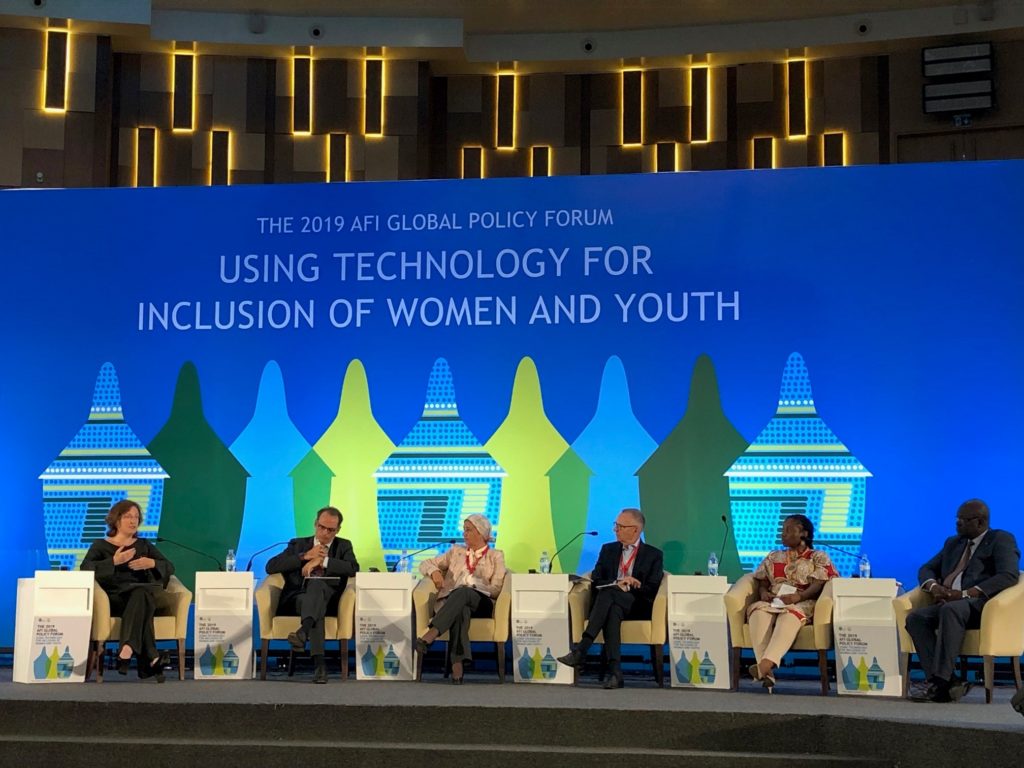Last week, at the annual Alliance for Financial Inclusion (AFI) Global Policy Forum (GPF) in Kigali, Rwanda, over 800 policymakers, regulators, and international development stakeholders gathered to discuss the GPF theme of “Using Technology for Inclusion of Women and Youth.”
Data2X was thrilled to be there, as AFI is a key partner in Data2X’s Women’s Financial Inclusion Data (WFID) partnership, which works to improve gender data to advance women’s access to and use of financial services. Here are some of our top highlights from the week:
There has been noteworthy national progress on gender data, particularly on supply-side data, in the last year alone.
AFI members and the network as a whole have taken significant strides to improve gender data, particularly sex-disaggregated supply-side data, since the last GPF one year ago.
The importance of gender data came up in several closed and public sessions at the Forum, signaling the network’s prioritization of gender data. We were excited to see regulators from Rwanda, Egypt, and Zambia make the business case for gender data by sharing their efforts to build and automate sex-disaggregated supply-side data frameworks. With the National Bank of Rwanda (BNR), Data2X published a case study documenting BNR’s journey towards better sex-disaggregated supply-side data at the GPF.
Similar case studies highlighting the experience of the Bank of Zambia and Central Bank of Egypt, supported by AFI and Data2X, are forthcoming in Fall 2019, and initial gender data collection from financial service providers is also underway in Afghanistan, Argentina, and Honduras, amongst other countries. This will increase the critical mass of countries with supply-side gender data to inform policy and market solutions for women.
With AFI’s expanded commitment to gender within the financial inclusion, as demonstrated by the formation of the AFI Gender Ambassadors and new support from Swedish International Development Cooperation Agency to improve sex-disaggregated data, we believe that member countries will continue to progress in their efforts to collect and use gender data to accelerate women’s financial inclusion.
“Once you have the data, you can act based on what the data has said.”
–Dr. Monique Nsanzabaganwa, Deputy Governor of the National Bank of Rwanda

Data challenges — and solutions — can be common across countries.
A cross-cutting theme emerging from the WFID case studies was reinforced at the GPF: many countries are facing similar challenges related to gender data.
These challenges include:
- Lack of awareness of importance or utility of gender data from reporting institutions;
- Lack of ability for information management systems to sex-disaggregate;
- Issues with double-counting and classification of joint accounts; and,
- Lack of national definitions when it comes to key variables, such as a “women-owned” business.
In countries without robust national ID systems, regulators have an additional hurdle to clear when it comes to sex-disaggregation. Peer-learning networks like AFI can help surface these common challenges and present innovative solutions from other countries.
With the expansion of digital financial services, there are new opportunities and risks for gender data.
Given this year’s GPF theme, a key point of discussion throughout the Forum was the increasing digitization of financial services. While it holds enormous potential for improving women’s financial inclusion, digitization can also exacerbate gender gaps in both the financial and digital divide.
Similarly, digital financial services (DFS), including FinTechs, also offer opportunities — and raise new risks — for expanded gender data collection and use. For example, FinTechs using blockchain technology, such as Celo, have huge potential to share data insights on gender through payment traceability and users’ identity attributes. Yet with the advent of DFS, data ethics, privacy standards, and algorithms must be incredibly robust to protect from misuse of gender data and gender bias.
Digital platforms can also support in other aspects of women’s financial inclusion—for example, Rwanda digitized their land registration through a blockchain platform, which has significant implications for women’s increased collateral.
Gender data from this platform indicates that 58% of Rwandan women share land ownership with spouses through marriage and that 24% of women have sole land ownership (through female-headed households) as compared to 14% of men having sole land ownership (male-headed households).
We’re thrilled to see that the AFI network is forging ahead on gender data and considering new questions as the field of financial access and use evolves to include all. We look forward to hearing more stories of national advancement and efforts on gender data at the next GPF in Jordan 2020.
